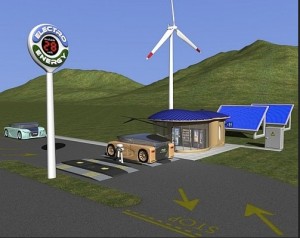Want a look at the new, de-centralised renewable electricity world that’s coming? Check out UBS report.
The Zurich-based Swiss bank, UBS, recently (20 August 2014) issued a report that calls solar systems and batteries “disruptive technologies for the electricity system.” Interesting, useful language.
Along with electric vehicles (EV), solar and batteries will re-shape the electricity system making electricity users the new generators. The report makes it clear that it is focusing on the impact on utilities and the auto sector, and that its analysis depends on the combined effect of EV + solar + batteries: the Holy Trinity.
Steeply declining battery and solar system costs will expand the usage of these technologies and allow a payback time as low as 6-8 years for combined EV + solar + battery investment by 2020, without subsidies. Critically, the rapid decline in battery costs (50% by 2020), will spur EV sales, with eCars to grab 10% of European market by 2025 with a sticker price comparable to a combustion engine vehicle but with a savings of Euros 2,000 per year.
At the same time, solar will be economically viable without subsidies and without intermittent supply. The cost of solar panels has dropped about 85% over the past 7 years. Solar’s growth, in part, will be because of stationary batteries that store energy during the day and release it at night. As a result the energy to supply eCars will be carbon-free.
This development, for UBS, is a game-changer in the march to a decentralized electricity market. As the report states, “By 2025, everybody will be able to produce and store power. And it will be green and cost competitive, i.e., not more expensive or even cheaper than buying power from utilities. It is also the most efficient way to produce power where it is consumed, because transmission losses will be minimised.” At 11.
Large scale power generation will be outmoded, but utilities can capitalise on developing smart distribution networks, small-scale back-up units, and providing new services to users as generators.
The new decentralised electricity world will only work in a smart grid environment. For example, the EV could be charged on a company parking lot with solar power from the owner’s rooftop panels at home while the owner is at work during the day.
UBS is not arguing that, as a result of this new electricity market dependent on renewables, we should leave fossil fuels in the ground or seas. But of course we can make that argument.
It’s refreshing to find some people engaging with long-term strategies instead of the political class 5-year plans and most companies’ focus on current bottom-line (and related stock price and executive compensation).
Sources
UBS, Global Utilities, Autos & Chemicals: Will solar, batteries and electric cars reshape the electricity system? neo.ubs.com/shared/d1V0tO4LmKMZuB3
John Vidal, “Big power out, solar in: UBS urges investors to join renewables revolution,” The Guardian (27 Aug 2014). www.theguardian.com/environment/2014/aug/27/ubs-investors-renewables-revolution
For more on short-term vs long-term thinking about climate change, see the Interview with David Healy in the Podcast section of the current (Sept. 2014) issue of irish environment



No comments yet, add your own below